Student Blog
Life Hacks
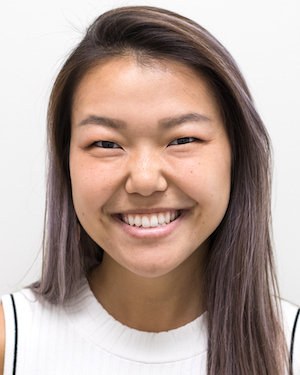
Challenge Accepted ⟩
October 17, 2019, by Kaho
Life Hacks
Growing up, I did a lot of individual sports. I ran my first 10k when I was five and from there, I participated in cross country, track, and swimming throughout my school years. I would get so much anxiety the night before a race that I often would not be able to sleep and it felt like my heart would literally flutter out of my chest. Nervous thoughts would flood my brain like, “Am I ready?” “Have I trained enough?” “What if I finish last?” “What if I don’t finish at all?” My mom, who is also an experienced athlete, would sit me down before each race and give me a little pep talk to calm my nerves. She would say various things each time, but one phrase that she repeatedly included and therefore stuck with me is, “無理やと思ってからが本当の勝負” For all of my non-Japanese speaking readers out there, it roughly translates to, “The real battle begins after you think you’ve reached your limit.” This sentence has become so engraved into me that I still hear my mom’s voice in my head every time I’m challenged or stressed to the point that I think I can’t/don’t want to try any further. It has translated over from sports to all aspects of my life and has become my life motto. It has truly helped me throughout numerous stages of my life. (Side note: it’s my mom’s milestone birthday on Monday, so quick shout out to her 🎉 )
I’ve learned that whenever I think I’ve reached my limit, how far I’m able to push myself from that point after is the real test in my strength and character. It has helped me to reframe stressful, sometimes seemingly hopeless situations. When I feel tempted to give up, I pause, reflect, and reset my thoughts. I think, “Okay, I’ve made it to the edge of familiar grounds. This is where things get interesting and exciting because I’m now entering new territory. This is only the beginning of a new self-improvement opportunity.” Think of it this way: you’re playing a video game and you lose a life at level 15. It makes you start back at level 1, but this time, level 1-15 is a piece of cake because you’ve already experienced those levels. No acquirement of a new skill happens here. When you reach level 15 again, you feel a little adrenaline because this was where you fell last time. You’re about to enter a level that you have yet to successfully overcome. This time, you’re able to conquer the challenge and move on to level 16, then level 17. Your limit is now level 17 and you’ve pushed yourself further than what you were familiar with or could tolerate before. How I see it, it’s the same with life. Each time you push yourself past your perceived breaking point, your capacity grows that much more.
Every day, we’re faced with new challenges and I completely understand that it all becomes too overwhelming sometimes. However, something as simple as reframing your thoughts can switch up your mood and give you the courage to keep advancing. Next time you’re faced with a situation that makes you want to give up, try taking a different perspective and get excited! It’s an opportunity to grow and become an even better version of yourself. I don’t know who or if anyone needs to hear this right now, but you’re much more capable than you may think. Fight On!
⋯
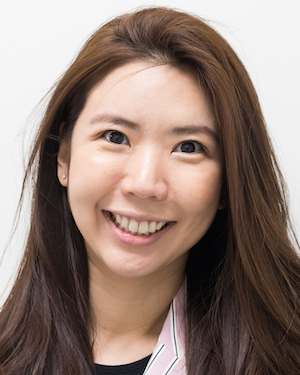
It’s Interview Season! ⟩
October 8, 2019, by Catherine
Admissions Life Hacks
Hello everyone! I hope you are all enjoying the beginning of the fall season. Along with pumpkin spice, and everything nice, the Chan residency interviews have begun. It thought it might be helpful for share some interview tips. Remember, interviewing for a residency is like interviewing for a job, and these tips can save to apply to when you interview at external residencies later on as well.
- Dress for success, and strike pose. I know you’ve heard it a million times, but I will say it again for good measure. While you don’t need to go outside of your means to purchase an entire new outfit, it really does make a difference when you dress for the position you want. Not only does it reflect a level a respect and professionalism, it can be helpful to get you into “the zone”. What also helps is to do a power pose. Take 5 minutes to do a power pose before going into your interview to level up on your confidence.
- Prepare an elevator speech. You’ve written countless ones of how you will describe occupational therapy, but it’s also good to have one about yourself. Writing an elevator speech about why you want the residency you’re applying for will not only have a handy go to answer if you are asked this question, but it will give you an opportunity to identity your strengths!
- Practice talking about yourself. If you’re like me, and feel uncomfortable talking about yourself under pressure, practicing talking about yourself can be really helpful. Find a safe space with someone you feel comfortable and do a “mock interview”. This can get your interview jitters out and help you feel more prepared on the big day.
- Write yourself a LTG. I mentioned this in a previous post, but setting a clear goal for what you want to achieve during your residency will help anchor your talking points. This will especially come in handy if you get a question you weren’t prepared to answer. Just tie it back to your goal(s).
- Be yourself! While sometimes it may seem like there is a “right answer” to an interview question, it’s always best to be true to yourself. One of the goals of an interview is find a good fit between the candidate and the residency site. Trust the process and be yourself.
Remember, take a deep breath, count to ten, use whatever relaxation strategy works for you, because you got this! Fight on!!
⋯
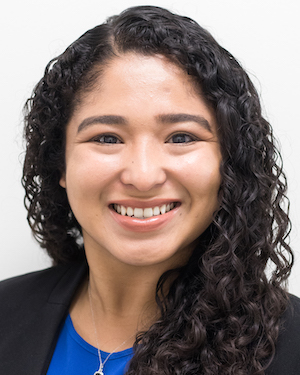
Don’t say yes, if you want to say no! ⟩
October 4, 2019, by Marilyn
Life Hacks
Humans are innate social beings that thrive on reciprocity. Our internal nature often leads us to people pleasing, in order to not disrupt a potential bond professionally and personally. When we make the decision to provide a quick yes, instead of the difficult no we overcommit. Overcommitting often leads to a decrease in energy, time, overall health, and sometimes finances, so it is important to really evaluate the weight of the yes.
The need to please others comes from the feeling of “I want to make everyone happy and I want to make sure that everything is okay.” However, sometimes making others happy leads to one’s own unhappiness. The recognition of my own people pleasing tendencies and lack of saying no were revealed to me during my first semester of grad school. I began to take on colleagues work shifts, was engaging in late night roommate conflict mediations, supporting residents during moments of crisis and providing them with referrals, driving home every other weekend, studying late hours, working hard at my fieldwork placement and the list can go on. All to say, I ended up getting sick for a week. My body was telling me that I needed to slow down and take a breather. As I was lying in bed trying to pinpoint when I began to feel sick, what came to mind was the different times I was saying yes to others and inadvertently saying no to me (spiritually, mentally, physically, and emotionally).
This week, I had conversations with mentors about the two lettered word: N-O. I wanted to learn about the strategies they developed over the years professionally and personally, in order to share it with you!
1. Opportunity Cost
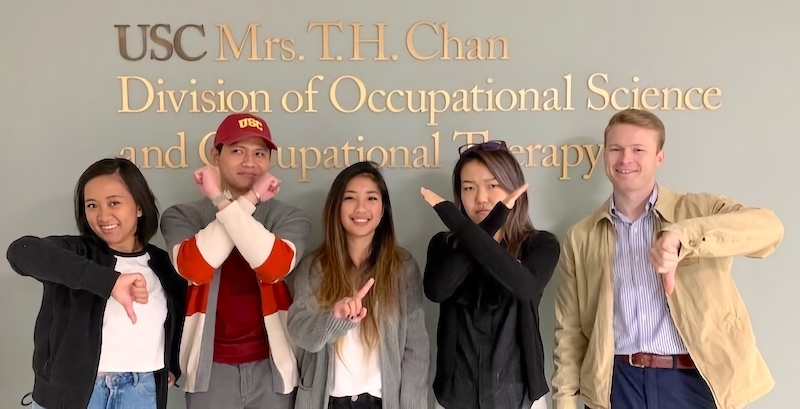
MA-I students (Macy Peralta, Mike Pacifico, and Japeth and MA-II students (Kaho Ishizuki and Kevin Urhik) expressing visually how they say no internally.
When making decisions there typically is an opportunity cost. Will I go to the movies this evening versus spending that time at home completing school tasks? Will staying up till 3am to study be effective or should I get some more time for sleep? Should I apply to this educational program when I need to make ends meet at home financially? These questions become overwhelming overtime, so it is important to be able to evaluate the opportunity cost. In the end it is important to understand that opportunities will continue to arise regardless of the one no you decided to say. Being able to weigh the pros and cons can provide you with clarity to move forward with one semi-solid decision, even when the unknown outcome seems daunting.
2. Be Intentional
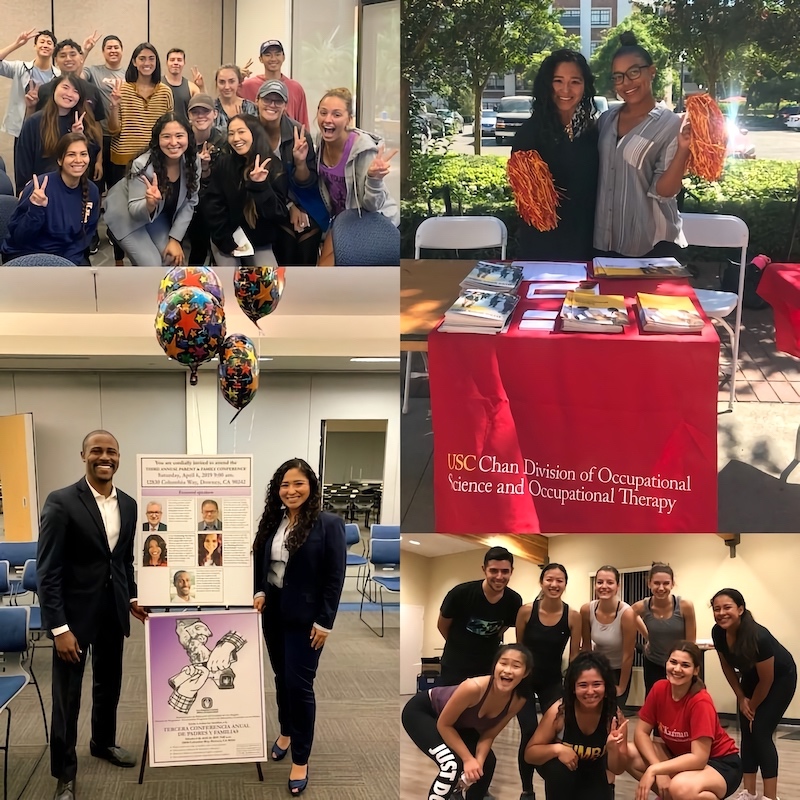
Top Left: CSUF Kinesiology Student Association presentation Bottom Left: Twinspire Non-profit organization presentation for parents and families Top Right: Student Ambassadors tabling at the Black and Latinx Symposium Bottom Right: Former housing residents and I after the zumba class I instructed
There is a difference in saying no just because you don’t feel like it versus being intentional and strategic about your motives. This strategy is one that I find that helps me out the most when determining my intentions behind saying yes or no to an opportunity. Depending on the urgency in response time provided to me, I try to give myself at least 24hrs before I say yes or no. By giving myself time to process my answer, I can begin to evaluate if it is manageable to say yes. Choosing to invest most into the things that I am passionate about and being intentional with not overcommitting myself will help both parties involved.
3. Being Transparent
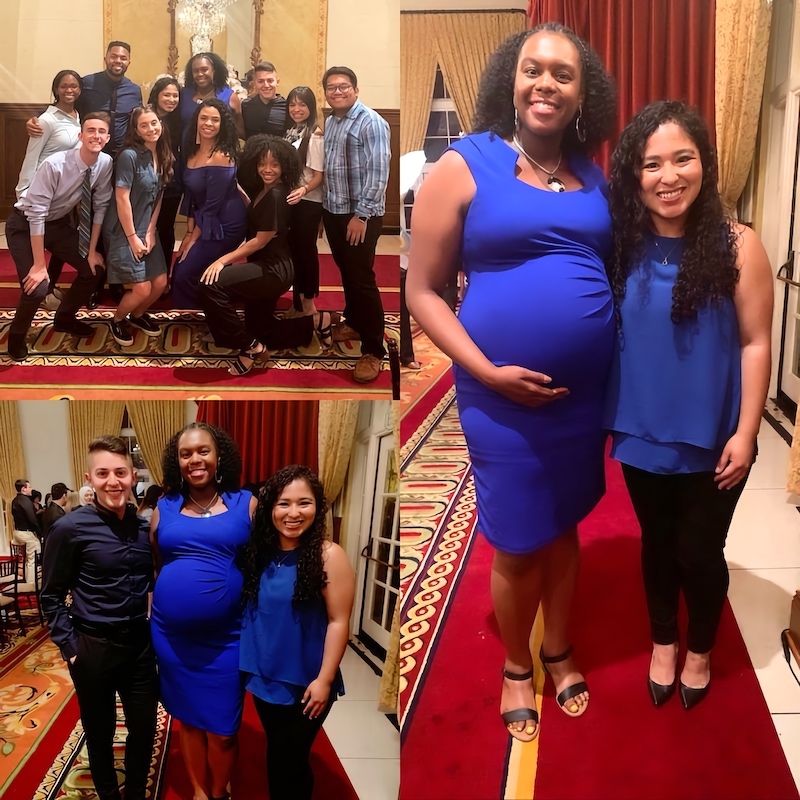
Residential Education End of Year Banquet. Top Left: Graduate & Family Housing East staff Bottom Left: Residential Community Coordinator Jasmine King and former Graduate Residential Community Coordinator JC Berber Right: Jasmine King (Queen of professional development/supervisor)
Honesty is the best policy, even when it regards saying no. I remember being asked if I was reapplying for the RA position in residential housing for my second year of grad school. It was challenging for me to say no because I had learned tremendously from my supervisor both professionally and personally. However, I knew that my second year of grad school would be a busy year with deciding to move back home, being selected as a student ambassador, looking for potential post-grad job opportunities, and beginning to apply to occupational therapy doctoral programs. I decide to be transparent with my supervisor about my workload for my second year and I left the conversation beyond encouraged. She was understanding of the new responsibilities I had taken on and she reminded me that I would be more than fine regardless of the outcome. She taught me about the importance of reframing the no into a yes, “I am unable to take this on because I need to take care of my spiritual, mental, emotional, and physical health.” Many times situations seem worse because you react and frame it as a negative thought, “I am a horrible person for saying no” “I can’t let her down.” In reality, if we just tried being more honest about our thoughts and how we are feeling the reframing would be useful. The reframing of “no I unable to serve in this capacity” is often the YES we need for ourselves to protect our wellbeing.
4. Accepting the “No’s” you will receive
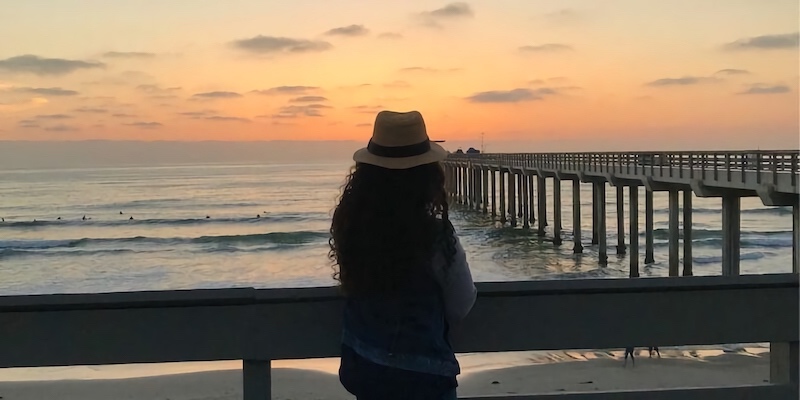
Took a trip to La Jolla Beach in San Diego after receiving some rejections from job offers
Saying no is a two-way street. As we begin to learn how to say no to others, it is equally important to be understanding when someone tells you NO. This past week OTD applications were submitted and interviews will commence soon. As I reflect on my decision to apply to the OTD program, I recognize that I am saying yes “I am ready to start this next chapter professionally”. However, there is a possibility in receiving a no from potential residency sites that I am interested in. That “no” may initially feel as rejection, but in reality it is possible that the no is necessary for a new opportunity to arise. Stepping back and regaining perspective after a no is important. No’s will continue to come whether that be in receiving a no from residency sites, no from future employers, no because it is not the right time yet, or no from someone in your personal life. In the end, it is about accepting the no in a respectful way, not taking it personally, and seeing it as a period of growth.
⋯
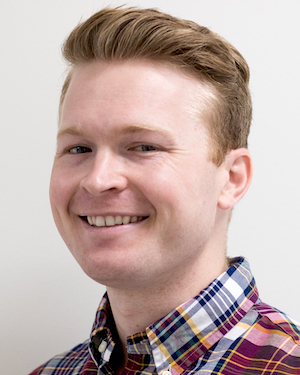
Puzzled ⟩
October 2, 2019, by Kevin
Life Hacks
While in graduate school it’s more important than ever to take care of yourself and find something you love to do for relaxation or fun! Since I was 13 years old, that activity for me is making puzzles. Soon after discovering the Rubik’s Cube, I was hooked and wanted to make my own puzzles. While I started from humble beginnings sculpting each puzzle piece by hand, technological advances and support from the community of fellow puzzle enthusiasts brought me to 3D-printing my puzzle designs from home! Through this hobby, I made friends with people all over the world and collaborated on designs that have been brought to the mass market.
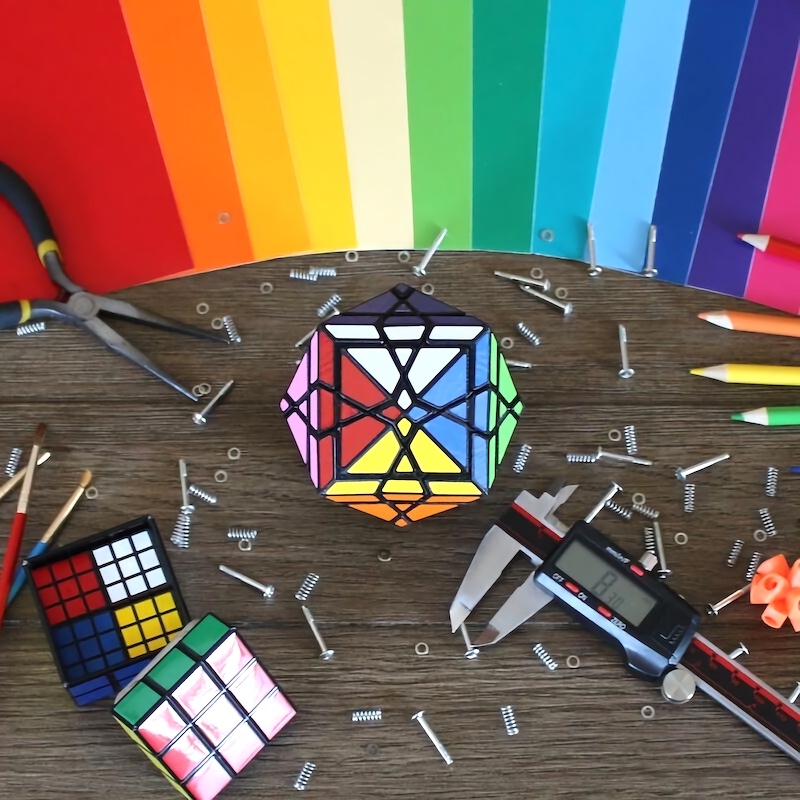
Puzzles give me the creative and stress-relieving outlet I need at the end of each day to calm my mind. While some people view Rubik’s Cube as headache inducing, for me there is nothing more peaceful than creating and solving puzzles. Along with providing a productive self-care activity, I have turned this hobby into a part-time job selling puzzles on Etsy and designing for puzzle manufactures.
This year, I challenged myself to create a new puzzle each week and so far I have met my goal and I am currently making my 40th design. Pictured below are some of my favorite designs from my puzzle-a-week challenge along with a picture of a 3D-design.



Within occupational therapy, I have used my puzzles to build rapport with clients and let them into my occupational world as they let me into theirs. Additionally, several of my less complex puzzles have been great for practicing fine motor and visual perception skills with kids!
As my puzzle-a-week challenge year comes to an end, I am shifting my focus to applying my love for 3D design and creation of complex mechanisms to the Mark and Semira Moshayedi Innovation Award competition. I am hoping to combine my love for creation with my passion for occupational therapy to create new ergonomic equipment! Look out for a blog in the future about the Moshayedi Innovation Award competition and the new Innovation Bootcamp!
⋯

You’ve Submitted Your Application, Now What? ⟩
October 1, 2019, by Catherine
Admissions Life Hacks
Congratulations to all who have submitted your OTD applications for the Chan residencies! You did it! I am happy and proud that you have decided to take the next step in your academic/professional journey. When I was in your position, applying for all the wonderful opportunities Chan has to offer, I had experienced anxieties about committing. More specially, I remember I was second guessing myself. Did I even know where I wanted to practice? What if I make the wrong choice and regret it? If this sounds familiar to you, I would like to share some strategies that helped me:
- Take a deep breath: Relax. The hardest part, taking that first step and leap of faith in yourself and capabilities is over. You got this.
- Reflect: Journaling, as you may all know, is a great way to organize your thoughts. Take some time to journal about why you came into OT in the first place. This will give you a visual aid in organizing your thoughts about where you want to take your OTD, and how you can make it fit into your career goals. This will also give you a foundation to work off of when prepping for interviews.
- Ask: If you have applied to one or more USC Chan residency, and want more information on what the residency looks like from a student perspective, don’t be shy to reach out to the current resident. We were all in your shoes once and can relate. If your feel uncomfortable cold calling a resident you don’t know, feel free to use me as an alternate resource.
I hope this post was helpful. And remember I am here for you!! 😃 ✌️
⋯





